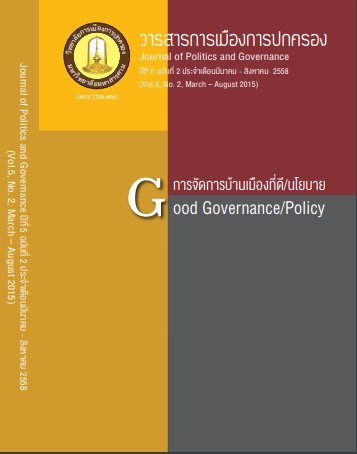Harmony in Thai Pluralistic Society
Main Article Content
Abstract
Rejection of Thai pluralistic society and force of government to Thai social convergence were doomed to the failure of harmonic construction in Thai society. This paper used the idea of state-society relations which concerned about power of state in policy making process and implementations. The idea explains Thai social resistance and the problems of harmonic construction in Thailand. The examples in this paper present policies of General Prem Tinsulanonda to solve security problems and made harmony in 1980 period. If the government construct participatory democratic political culture and make pluralism in state–society relations to support political institutions for commitment to democracy and democracy that is an only game in town, the return of harmony to make stability and sustainable development and making of civil society in Thailand could be successful.
Article Details

This work is licensed under a Creative Commons Attribution-NonCommercial-NoDerivatives 4.0 International License.
References
กฤตยา อาชวนิจกุล และคณะ. (2549). ความรุนแรงและความตายภายใต้นโยบายรัฐ : กรณีสามจังหวัดชายแดนภาคใต้. โดย http://www.ipsr.mahidol.ac.th/IPSR/AnnualConference/ ConferenceII/Article/Article12.htm. (เข้าถึงเมื่อวันที่ 23 มิถุนายน 2557).
ชนิดา ชิตบัณฑิตย์. (2554). โครงการอันเนื่องมาจากพระราชดำริ : การสถาปนาพระราชอำนาจนำในพระบาทสมเด็จพระเจ้าอยู่หัว. พิมพ์ครั้งที่ 2. กรุงเทพฯ : มูลนิธิโครงการตำราสังคมศาสตร์และมนุษยศาสตร์.
ชาญวิทย์ เกษตรศิริ. (2555). กาลานุกรมสยามประเทศไทย 2485-2554. กรุงเทพฯ : โพสท์ พับลิชชิง.
ธงชัย วินิจจะกูล. (2557). ใน ประชาธิป’ไทย: สารคดี โดย เป็นเอกรัตนเรือง และ ภาสกร ประมูลวงศ์. ชานันท์ ยอดหงษ์ เรียบเรียง. พิมพ์ครั้งที่ 3, กรุงเทพฯ : มติชน.
ธำรงศักดิ์ เพชรเลิศอนันต์. (2557).ใน ประชาธิป’ไทย: สารคดี โดย เป็นเอกรัตนเรือง และ ภาสกร ประมูลวงศ์. ชานันท์ ยอดหงษ์ เรียบเรียง. พิมพ์ครั้งที่ 3, กรุงเทพฯ : มติชน.
นิธิ เอียวศรีวงศ์. (2557). ผ้าขาวม้า,ผ้าซิ่น,กางเกงใน และ ฯลฯ ว่าด้วยประเพณี, ความเปลี่ยนแปลง และเรื่องสรรพสาระ. พิมพ์ครั้งที่ 2. กรุงเทพฯ : มติชน.
นิธิ เอียวศรีวงศ์. (2558). นิธิ เอียวศรีวงศ์: สงคราม กองทัพ และการเมือง. มติชน สุดสัปดาห์ 20-26 มีนาคม 2558. โดย http://www.matichon.co.th/news_detail.php?newsid=1427366145. (เข้าถึงเมื่อ 11 พฤษภาคม 2558).
บวรศักดิ์ อุวรรโณ. พลวัตการเมืองไทย. โดย http://www.kpi.ac.th/kpith/index.php?option=comcontent&task=view&id=95&Itemid=214. (เข้าถึงเมื่อวันที่ 9 กันยายน 2556).
มูลนิธิรัฐบุรุษ.(2549). รัฐบุรุษชื่อเปรม. พิมพ์ครั้งที่ 2. กรุงเทพฯ : มติชน.
รังสรรค์ ธนะพรพันธุ์.(2536). อนิจลักษณะของการเมืองไทย เศรษฐศาสตร์วิเคราะห์ว่าด้วยการเมือง กรุงเทพฯ : ผู้จัดการ
สมศักดิ์ เจียมธีรสกุล.(2555). อ้างใน ศุภมิตร ปิติพัฒน์. บทวิพากษ์ธรรมวิทยาแห่งพลเมืองของประกาศร่วมสมัย. กรุงเทพฯ : คบไฟ.
สุจิต บุญบงการ.(2542). การพัฒนาทางการเมืองของไทย : ปฏิสัมพันธ์ระหว่างทหาร สถาบันทางการเมือง และการมีส่วนร่วมทางการเมืองของประชาชน. พิมพ์ครั้งที่ 4. กรุงเทพฯ : สำนักพิมพ์จุฬาลงกรณ์มหาวิทยาลัย.
เสน่ห์ จามาริก. (2549). การเมืองไทยกับพัฒนาการรัฐธรรมนูญ. พิมพ์ครั้งที่ 3. กรุงเทพฯ : มูลนิธิโครงการตำราสังคมศาสตร์และมนุษยศาสตร์.
ศุภมิตร ปิติพัฒน์. (2555). บทวิพากษ์ธรรมวิทยาแห่งพลเมืองของประกาศกร่วมสมัย. กรุงเทพฯ: คบไฟ.
อรรถจักร สัตยานุรักษ์.(2557). ประชาธิปไตยคนไทยไม่เท่ากัน. กรุงเทพฯ: มติชน.
อนุสรณ์ ลิ่มมณี. (2558).รัฐ สังคม และการเปลี่ยนแปลง การพิจารณาในเชิงอำนาจ นโยบายและเครือข่ายความสัมพันธ์.พิมพ์ครั้งที่ 2. กรุงเทพฯ: ศยาม.
อุไรวรรณ ธนสถิต. วัฒนธรรมทางการเมืองแบบประชาธิปไตย.
Almond, G.a. and Verba, S. (1965). The Civic Culture: Political Attitudes and Democracy in Five Nations. Boston: Little, Brown and company.
Barkey, K. and Parikh, S.(1991) Comparative Perspective on the State. Annual Review of Sociology. Vol.17 (1991). pp. 523-549.
Draper, J.and Streckfuss, D.(2015). Minorities and minority rights in Thailand. New Mandala, 11-05-2015. โดย http://asiapacific.anu.edu.au/newmandala/2015/05/11/minorities-and-minority-rights-in-thailand/. (เข้าถึงเมื่อ 14 พฤษภาคม 2558).
Laski, H. (1955). The Sovereignty of the State. in Readings in Recent Political Philosophy. Edited by Magaret Spahr. New York: Macmillan. pp. 529-536.
Migdal, J. (1988). Strong Societies and Weak States. New Jersey : Princeton University Press.


